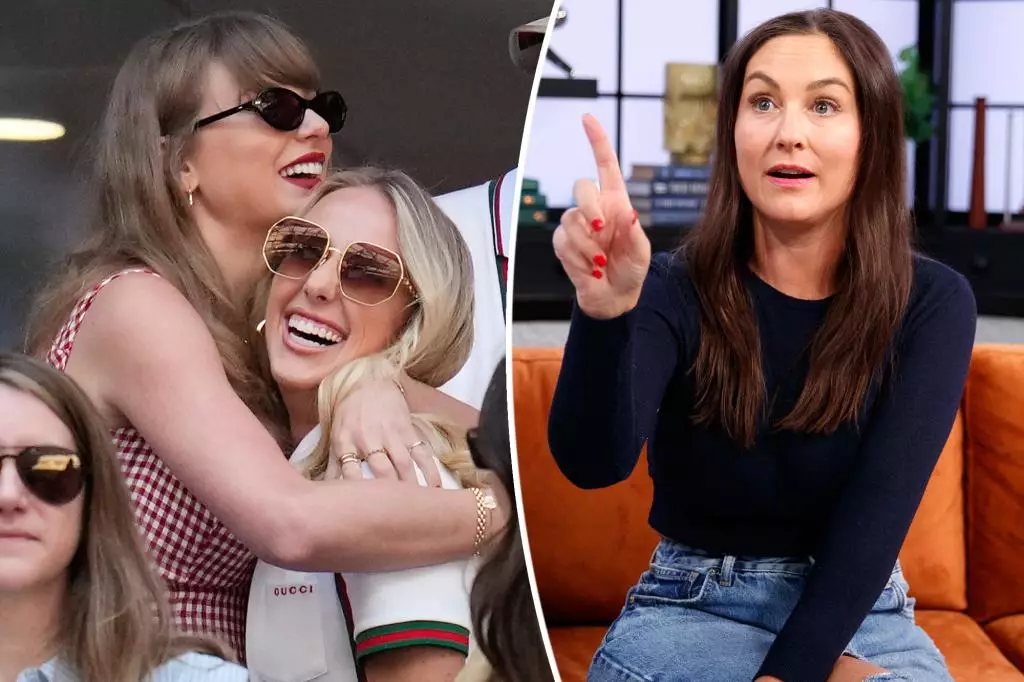The world of celebrity relationships is often filled with scrutiny and intrigue, particularly when high-profile figures like Taylor Swift and Brittany Mahomes strike up friendships. Such relationships frequently become fodder for public discussion, provoking a mix of admiration, envy, and criticism. The recent commentary from Taylor Strecker, host of the “Taste of Taylor” podcast, sheds light on this dynamic, calling into question the worthiness of certain friendships while also revealing the complexities of celebrity stature and social circles.
Strecker’s vocal critique of Brittany Mahomes’ friendship with Taylor Swift makes for a fascinating examination of celebrity friendships in the age of social media. The various platforms allow fans and onlookers to dissect every move made by these stars. In her comments to Page Six, Strecker expressed her belief that Brittany is not “worthy” of being friends with Swift, a sentiment that reflects the broader phenomenon of fandom and social hierarchies among celebrities.
Fans often view celebrities not only as entertainers but as figures to scrutinize—leading to assessments of their worthiness in maintaining relationships with other famous individuals. Strecker’s comments, rooted in her passion for Swift, reveal how fans often feel entitled to have opinions on their favorite star’s acquaintances. This reveals an inherent contradiction: fans admire these celebrities for their accomplishments yet paradoxically apply strict criteria to those who associate with them.
Strecker’s remarks touch upon the nature of connection among celebrity partners as well. Brittany Mahomes’ relationship with Swift can be perceived as largely centered around their significant others—Travis Kelce and Patrick Mahomes, respectively. According to Strecker, when you date someone deeply entrenched in a celebrity culture, especially a teammate like Patrick, it’s unavoidable to be drawn into that web of relationships.
“This is what you do when you date a guy,” Strecker asserts, offering an interesting take on the institutionalized social practices among celebrities. Therefore, Mahomes’ connection with Swift isn’t merely circumstantial; it’s a natural overflow of their partners’ bond, making their friendship less about personal choices and more about shared public personas.
Apart from the social dynamic, Strecker also criticized Brittany Mahomes’ fashion choices, indicating that she believes Brittany’s style doesn’t align with Swift’s grandeur. This brings forth another layer of analysis regarding the perceived image and expectations surrounding celebrity friendships. In a world where fashion often represents identity and standing, Strecker’s perspective posits that Mahomes might tarnish the sleek reputation associated with Swift.
Strecker’s humorous assertion that Mahomes’ wardrobe “infuriates” her highlights how celebrity appearances play a crucial role in public perception. It suggests that when a lesser-known figure engages with a major star, their fashion choices also become subject to wider critique, reinforcing social hierarchies within celebrity culture.
Despite the backlash, Brittany Mahomes has not shied away from defending her association with Swift. Her response to critics emphasizes an important point: the desire for personal connections often transcends public opinion. Mahomes’ assertive stance on social media furthers the notion that celebrity friendships can exist independently of fan scrutiny and judgment.
This relationship reflects a broader struggle that many public figures face: the ability to maintain authenticity amidst a backdrop of overwhelming public critique. Mahomes’ insistence on the significance of her relationships—regardless of Strecker’s commentary—demonstrates resilience in the face of public perception.
The relationship between Brittany Mahomes and Taylor Swift is emblematic of the complex interplay between personal agency and public opinion in the celebrity realm. The discussions surrounding their friendship reveal much about how society engages with celebrity culture, highlighting issues of worthiness, image, and defiance against societal standards. As fans and public observers, it’s essential to remember that the world of celebrity relationships is multifaceted—built on personal connections that may not always align with our expectations or opinions. Ultimately, the authenticity of these friendships, much like any other relationships, deserves to be acknowledged beyond the lens of public scrutiny.
